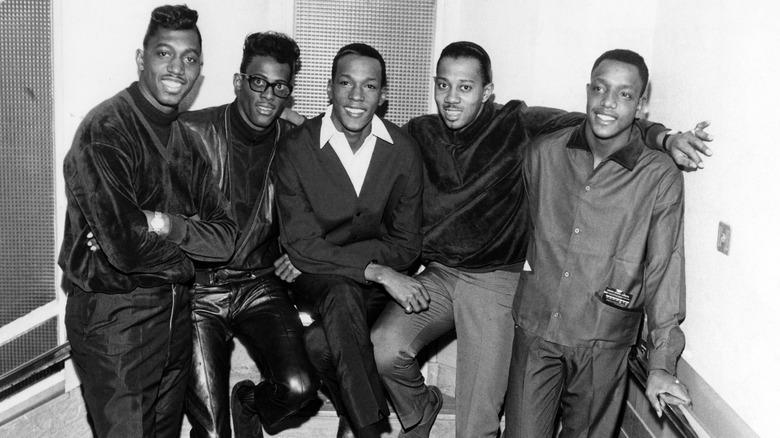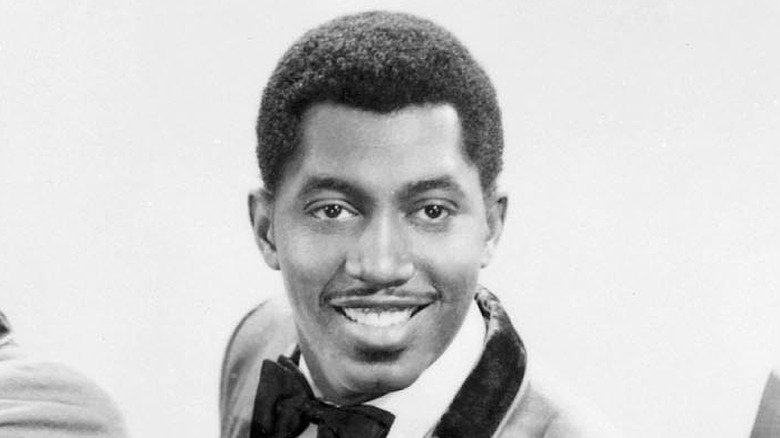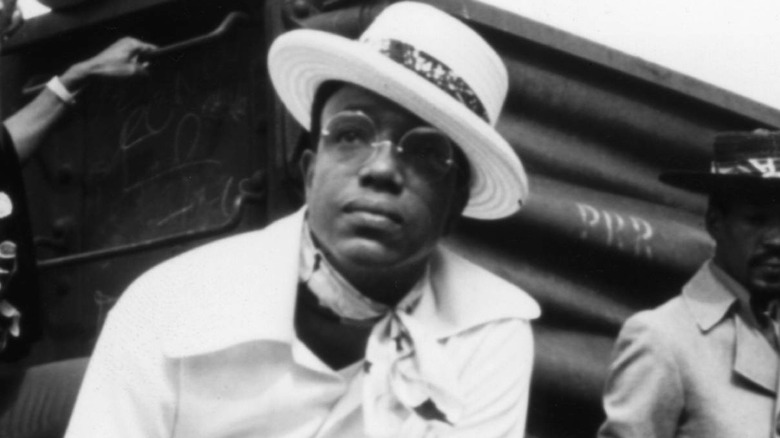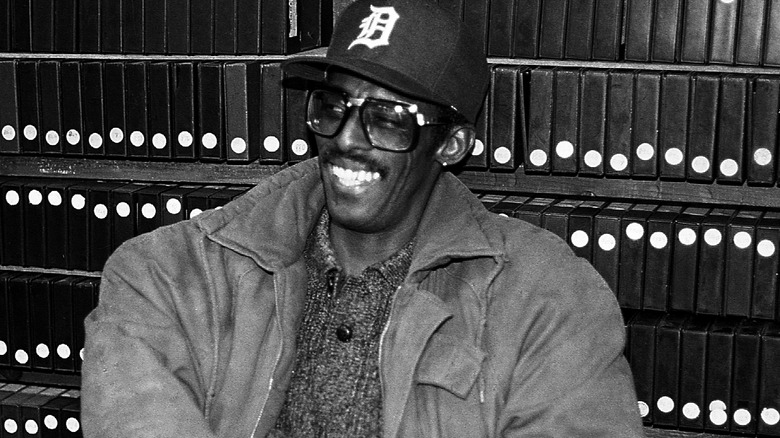Tragic Details About The Temptations
No conversation about classic Motown acts should be complete without a mention of the Temptations. Formed in the early 1960s as a combination of members from two different groups (the Distants and the Primes), the Temptations were one of several male singing groups to make a big impact in the decade's R&B and soul music scenes. However, there were a few things that set them apart from most of the pack — their vocal harmonies, the fact that any given member could sing lead, and their tight on-stage choreography. Those qualities undoubtedly helped them to great success, as the Tempts have more than 50 hits on the Billboard Hot 100 charts, including four No. 1 singles and 15 Top 10s.
Unfortunately, the Temptations also stood out from most other vocal groups for one unpleasant reason — they were a band beset by tragedy before, during, and after their heyday. From impoverished, abusive backgrounds to substance use and abuse to untimely deaths of band members and family members alike, the Temptations have seen it all, and it's quite an impressive feat that despite all those personal and professional hurdles, they've been entertaining audiences longer than most people have been alive. So with all that out of the way, let's look at the more tragic stories from the Temptations' six-plus-decade history.
David Ruffin had a particularly tough upbringing
Out of all the members of the Temptations' classic 1960s lineup, David Ruffin probably had the roughest childhood. Born Davis Eli Ruffin in Whynot, Mississippi, on January 18, 1941, the would-be soul legend lost his mother at a very early age and grew up in poverty. His father, Eli Ruffin, was reportedly an abusive man who made David and his siblings perform at churches as a singing group, and while his older siblings allegedly suffered physical abuse at the hands of the family patriarch, David and his brother Jimmy — later a successful solo singer in his own right — endeared themselves to their father through their vocal skills.
"Mr. Eli would take them from church to church on Sundays, and people would feel sorry for these motherless children," recalled David's niece Gina Ruffin Moore in an interview with The Philadelphia Inquirer. She would also share more uplifting stories about her famous uncle, relating that when David was in his early teens, he would pretend he was on "The Ed Sullivan Show" and ask his playmates to clap for him as he performed. For a boy who grew up without a mother and with very little material wealth, making believe that he was a popular singer was just about all he could do — that is, until he moved to Detroit in the early '60s with those childhood ambitions still very much alive.
Original member Al Bryant was never the same after his firing
It's not too often when someone's dismissal from their group becomes life-changing in the wrong sort of way. But that's apparently what happened to original Temptations member Al Bryant, who was dismissed from the band in late 1963 after his belligerent behavior — often fueled by his heavy drinking — manifested itself one time too many.
"Trouble was that on top of the drinking, Al developed a bad attitude," Otis Williams explained in the book "Temptations," noting that Bryant began acting out as the group's profile continued to grow. In mid-1963, Bryant attacked Paul Williams with a beer bottle after a show, but somehow remained with the group, with Paul convincing the others not to sack their increasingly troubled bandmate. But when Bryant caused yet another stir at Motown's 1963 Christmas party, the other Temptations decided enough was enough — he was fired, and would soon be replaced by David Ruffin.
As Otis Williams related later on in "Temptations," the group encountered Bryant five years later following a show at Detroit's Cobo Hall, and he was in quite a disheveled state. "His hair had grown long and unruly, and there were big dark circles around his eyes," the veteran singer wrote. "His skin was the color of ash." Otis also remembered detecting a "deep sadness" in Bryant's words when they spoke backstage on that day in 1968. Bryant was only 36 years old when he died of cirrhosis of the liver on October 26, 1975, in Florida.
Paul Williams' descent into alcoholism
During their earlier days as a group, Paul Williams was the only member of the Temptations who abstained from alcohol consumption. He would, in fact, lecture his bandmates about ruining their health whenever he'd catch them covertly drinking. That's why it's tragically ironic that Williams descended into alcoholism as the Tempts began to enjoy massive success as one of Motown's most popular acts.
According to Otis Williams in "Temptations," Paul's drinking problem might have started when he entered an affair with a woman named Winnie Brown, who worked as the Supremes' hairstylist. "Paul had married young and had five children," Otis wrote. "He was devoted to his family but torn between them and Winnie. Before too long Paul, who never took anything stronger than milk, started drinking."
All in all, however, Otis Williams acknowledged in his book that it's hard to pinpoint an exact cause or driving factor for Paul Williams' problems with the bottle. But as he told Deseret News in 1998, it was difficult watching his bandmate develop a drinking problem almost out of nowhere. "[T]o see a guy come from drinking milk to drinking, sometimes, two to three-fifths of Courvoisier a day – that was kind of hard to take," he said.
Ruffin's drug misuse started at a young age and continued for decades
David Ruffin started developing some bad habits during the Temptations' peak years. While it cannot be stressed enough that his heartfelt vocals helped take the Tempts to much greater heights in the mid-'60s, his personal issues would linger for most of his adult life, and compromise his undeniable talent as one of Motown's most distinctive voices of the decade.
It is believed that Ruffin's drug misuse started at some point in the 1960s, though it was only in the later part of the decade when it truly became a problem; Ruffin first entered drug rehabilitation in 1967. Two decades later, well after his and his band's heyday, the singer ended up in jail after law enforcement officials found him in possession of drugs. After violating the terms of his probation for misdemeanor cocaine possession in 1988, Ruffin, now in his late 40s, was back in rehab.
"He was getting high so much. The man was a walking skeleton," Ruffin's friend Linster "Butch" Murrell told The Philadelphia Inquirer, looking back on the singer's later years and how he had yet to kick his drug habit. Speaking to the same outlet, Daryl Hall of Hall & Oates shared his experiences working with Ruffin in the 1980s and sadly acknowledged that at the time, the musician "was hanging with a bad crew" of people who enabled his use of illicit substances.
Paul Williams died by suicide in 1973
Not only was Paul Williams still dealing with alcoholism at the start of the 1970s, the Temptations singer also suffered from sickle-cell anemia, a fact he kept a secret from the group's fans, as noted by uDiscovermusic. The combination of these two factors made him increasingly erratic onstage, and when doctors found a spot on his liver during a 1971 checkup, Williams quit the band. It didn't help that he and his wife reportedly separated in 1972 and that he allegedly owed about $80,000 in taxes. Without a doubt, the talented singer and dancer was going through a lot of personal turmoil.
Following his exit from the Temptations, Williams remained close to the group and served as their choreographer behind the scenes. He was also working on some songs in hopes of launching a solo career. Sadly, on the night of August 17, 1973, Williams was found dead at 14th and W. Grand Blvd. in Detroit, slumped in the front seat of a car with a gun in his hand; supposedly, he had left his then-girlfriend's house a few hours prior following an argument. While there have been theories suggesting that there was foul play involved in the singer's passing, his death was officially ruled as death by suicide.
Otis Williams' son Lamont died in a workplace accident in 1985
Despite the fact he hardly sang any lead parts on the Temptations' many classic hits, Otis Williams played — and continues to play — a key role in the group as one of its founding members, its longtime leader, and its self-described "glue," as he told Rolling Stone in 2018. And he kept things together in the band despite enduring his share of personal challenges, including the end of his first two marriages and, far more notably, the untimely death of his son Lamont. Otis Lamont Miles, who made his living as a construction worker, was just 24 years old when he was killed in a workplace accident on August 8, 1985.
Speaking to the Express in 2023, Williams shared that it was the thrill and satisfaction of performing live with the Tempts that helped him through that difficult time in his life. "I was grieving because I lost my son, but when I got up on stage, I realized I was bringing people happiness, so whatever sorrow I had within me, I let it transfer out into that audience having a wonderful time and enjoying our music," he told the outlet. "I've always taken negativity and turned it into a positive."
David Ruffin died of a cocaine overdose in 1991
Despite multiple attempts to get his life and career back on track, including a 1982 reunion tour with the Temptations that prematurely ended in part due to his flaky, drug-fueled behavior, David Ruffin was still weighed down by substance misuse in the last few years of his life. The voice behind hits such as "My Girl" and "Ain't Too Proud to Beg" died on June 1, 1991, at the age of 50, having collapsed at a crack house he visited on the night before his passing, according to The Washington Post. On June 10, the Philadelphia medical examiner's office confirmed that Ruffin accidentally overdosed on cocaine, per Deseret News.
In the band biography "Temptations," Otis Williams wrote about the last time he saw Ruffin alive, which was at a Las Vegas concert just a few months before his death. "David came backstage to see us after the show, and while I had known David as a drug user since the late 1960s, I didn't recall ever seeing him look so bad," Williams remembered. "The drugs ... left him looking sunken and emaciated." Williams would later explain that he knew right then and there that Ruffin's days were most likely numbered, given his poor physical shape at the time he was catching up with his former bandmate.
Eddie Kendricks died of lung cancer in 1992
Best known for his falsetto vocals, which he utilized to perfection on songs such as "The Way You Do the Things You Do," "Get Ready," and "You're My Everything," Eddie Kendricks was already a shadow of his old self during the ill-fated Temptations reunion tour of 1982. At that point, his many years of heavy cigarette smoking had left him unable to reach the high notes he used to hit so effortlessly as a younger man. Nonetheless, he continued to perform live over the next several years, oftentimes with fellow ex-Temptations David Ruffin and Dennis Edwards.
By the early '90s, Kendricks' health problems began to escalate, and he had one of his lungs removed in 1991, later warning young people not to smoke as he had been doing for the past three decades or so. The singer was 52 years old when he passed away from lung cancer on October 5, 1992, at a hospital in his hometown of Birmingham, Alabama.
As quoted by The Washington Post, the Temptations' first manager, Esther Edwards, looked back on Kendricks' legacy as one-fifth of the group's best-known lineup. "Eddie just had that great, great tenor voice that just was so captivating," she said in a statement. "He had such admirers, men and women. But the ladies really loved Eddie and his style ... He just had a sweet, melodious, captivating, tender sound."
Melvin Franklin's death left Otis Williams as the last surviving classic Tempt
Following the respective deaths of David Ruffin and Eddie Kendricks in 1991 and 1992, a third member of the classic Temptations lineup passed away in the 1990s. Melvin Franklin, the Tempts' longtime bass singer who, at that point, had been with the group since its inception, died on February 23, 1995, at the Cedars-Sinai Medical Center in Los Angeles at the age of 52. His cause of death was listed as heart failure, though his condition was also exacerbated by diabetes. That left Otis Williams as the sole surviving Temptation from the group's original lineup.
Toward the end of his eponymous Temptations biography, Williams looked back on the death of his best friend of more than three decades, offering a short but touching tribute to their many years as buddies and bandmates. "I loved all the Temptations like brothers, but it was Melvin who had stood shoulder-to-shoulder with me through the good times and the bad," Williams wrote. "After Eddie died, there were two surviving original members, and that meant that Melvin and I each had someone who could understand who we were and how we felt. There were many things between [Melvin] and me that didn't even need to be said."
Dennis Edwards passed away under mysterious circumstances in 2018
There have been several former Temptations from the group's later lineups who have since passed away. However, Dennis Edwards' death in Chicago on February 1, 2018 — just two days before what would have been his 75th birthday — was particularly notable for reasons beyond the fact he was the group's lead voice during its successful "psychedelic soul" era in the late '60s and early '70s. Edwards' official cause of death was complications from meningitis, but as reported by The Detroit News, an emergency protection order, filed in January of that year, alleged that the singer was neglected and abused by his wife, Brenda, in the months leading up to his passing.
Some of the disturbing allegations from the order included claims that Brenda took away her husband's hearing aids, cellphone, and iPad, and an even more chilling accusation that she tried to suffocate him "by holding his head face down on the bed." Issa Pointer-Stewart, Edwards' daughter with fellow singer Ruth Pointer, also claimed she didn't hear anything about meningitis from her father's doctors.
Brenda Edwards denied the accusations, issuing a statement to The Detroit News that read, "I loved Dennis and we were married for 18 years. I would have never done anything to harm him. These allegations are false and defamatory and will be proven as such." Her name was cleared later in 2018, as officials found no evidence of the purported abuse.
If you or anyone you know needs help with addiction issues, is struggling or in crisis, is dealing with domestic abuse, or is dealing with elder abuse, contact the relevant resources below:
-
The Substance Abuse and Mental Health Services Administration website or contact SAMHSA's National Helpline at 1-800-662-HELP (4357).
-
Call or text 988 or chat 988lifeline.org.
-
The National Domestic Violence Hotline at 1−800−799−7233. You can also find more information, resources, and support at their website.
-
The National Adult Protective Services Association website.










